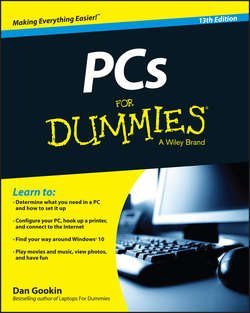Читать книгу PCs For Dummies - Gookin Dan - Страница 5
На сайте Литреса книга снята с продажи.
Part I
Hello, PC!
Chapter 1
What Is This Thing, This PC?
Some Quick Questions to Get Out of the Way
ОглавлениеDoubtless, your mind is abuzz with various questions about computers. I ask myself computer questions often, so don’t think that your curiosity is unusual. Trust me: Few people over the age of 26 are comfortable when first encountering anything high-tech.
“What is a PC?”
A PC is a computer – specifically, an acronym for personal computer.
Historically, the beast was known as a microcomputer. That’s because back in the 1970s, computers were huge, room-sized things that required legions of bespectacled scientists to operate. Individuals didn’t own such computers – well, unless you were eccentric or enjoyed printing your own phone bill. So mere mortals were sold a smaller version, which the Computer Professionals Union insisted be called a microcomputer.
Micro means teensy. The term is preferred by computer scientists because you can’t wear a white lab coat and be taken seriously when you use the word “teensy.”
Actually, the term micro comes from microprocessor, the main computer chip inside the early personal computers.
When IBM unveiled its first business microcomputer back in 1982, they called it the IBM Personal Computer – or PC, for short. All of today’s personal computers are descended from that original model, so they’ve inherited the term PC. Figure 1-1 displays a timeline of the PC’s history, in case you’re curious.
Figure 1-1: Timeline of the personal computer.
The only PC that’s not called “PC” is Apple’s Macintosh computer. Mac users refer to their computers as Macs. That’s based on an old IBM–Apple rivalry that no one cares about any more. Still, many Mac users get all huffy when you call their computers PCs. So it’s fine by me to tease those crybabies by referring to their expensive toys as PCs.
✔ The term PC generically refers to any computer that can run the Windows operating system.
✔ Although your car or sewing machine or the machine that goes “boop” at the hospital may contain computer electronics, those devices are not PCs.
✔ Curiously, IBM got out of the PC manufacturing business in the early 2000s.
✔
The success of the PC is based on its use of off-the-shelf parts that are easily replaced. The PC can also be configured and upgraded with ease, which is the main reason that it’s so popular.
“Why not just use a tablet or smartphone instead of a PC?”
Sure, you can get by in today’s well-connected, digital world by getting yourself a tablet or smartphone. To hell with computers!
Smartphones and tablets can send and receive email, browse the web, play games, and do all sorts of interesting things. They have several downfalls when compared with PCs:
✔ Mobile devices are designed for data consumption, not data production. If you’re merely passing through this digital life, you can get by with a phone or tablet and never own a PC. If you need to create something, you need a computer.
✔ PCs offer several input devices – specifically, the keyboard and the mouse. You can even add a touchscreen to a PC, if you’re into that touchy-tappy-swipey stuff.
✔ Mobile devices lack the expandability of a PC. You can upgrade a PC, adding more storage, memory, a better monitor, a mouse with 20,000 buttons, and so on.
✔ The typical computer lasts for years. A mobile device is usually replaced every other year.
Now, if you’ve changed your mind about getting a PC, remember that you cannot return this book once you’ve started reading this material.
“Should I buy a Dell?”
I get this question all the time, though “Dell” might be replaced by some other brand name. See the later section “Buy Yourself a PC!”
“Will my computer explode?”
This question is important, so please skip all the other questions I’ve placed before this question and read this question first!
If you’re a fan of science fiction television or film, you’re probably familiar with the concept of the exploding computer. Sparks, smoke, flying debris – it all appears to be a common function of computers in the future. Sure, they could just beep and display error messages when they die, but that’s not visually exciting.
The answer is no, your computer will not explode. At least, not spontaneously. If you pour fruit punch into the computer or lightning strikes or the power supply unexplainably fails, the most you may see is a puff of blue smoke, but no explosions.
